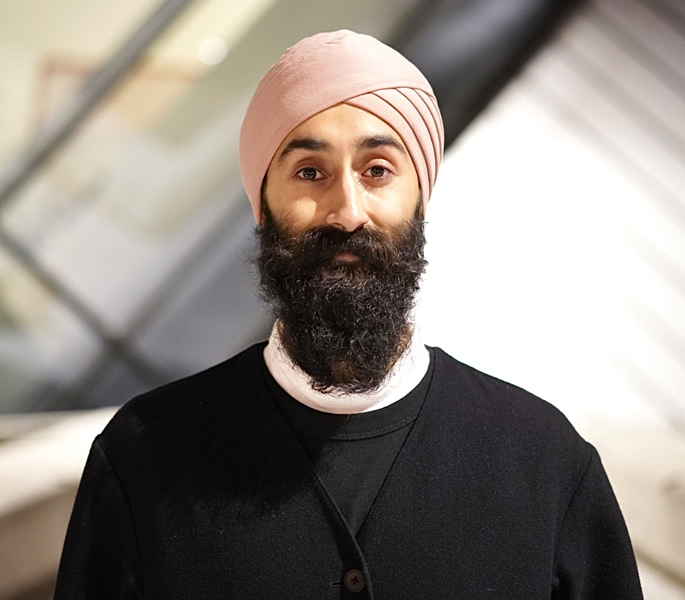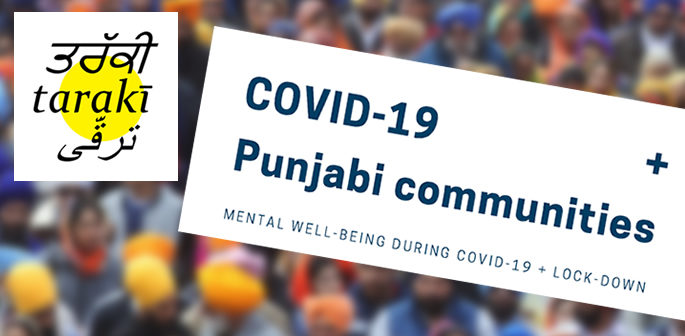“This report will be the start of further research."
COVID-19 has provided a unique opportunity to delve deeper into understanding mental health. Everyone has been affected.
The organisation, Taraki, investigated how Punjabi communities, in particular, have been impacted.
In an exclusive interview with Shuranjeet Singh, founder and director of Taraki, DESIblitz looks further into their recent report regarding the impact of COVID-19 on Punjabi mental health.
Taraki is a not-for-profit organisation with an ambition to do noble work. They help to reshape attitudes towards mental health in Punjabi communities via awareness, education and support.
Most importantly, Taraki conducts research. The research used amplifies awareness concerning mental health, building a foundation for a conversation on mental well-being and allows Punjabi communities to talk to each other with ease.
Publishing their new report in August 2020, Taraki discloses a startling insight into Punjabi mental health over COVID-19 and the lockdown period.
Statistics illustrate a 60% overall decrease in mental well-being within Punjabi communities, with data collected over the month of June 2020.
The largest decrease occurred with Punjabi’s who identify as LGBTQIA+, with an average of 30% decrease in mental well-being in those who have reported previous mental health challenges.
Why was this research done?
Other studies, during the pandemic, exposed a grim state of affairs for members of the BAME (Black, Asian, Ethnic Minority) community.
On average, in the UK, BAME people have a greater risk of dying once diagnosed with COVID-19 in comparison to white ethnic groups.
Several different contributing factors could lead to this unfortunate fact. These include social, environmental, biological, political or economic reasons.
There is a drastic juxtaposition in the experience of COVID-19 for different populations, like Punjabi communities compared to white ethnic communities.
Mental health has been extensively studied during the pandemic. However, the alarming result exposed higher levels of anxiety, depression, stress, loneliness and abuse were reported from members of the BAME community.
Now, a new issue arises. BAME is an umbrella term, it counts everyone who is not ethnically white.
So when looking at the effect of just one ethnicity, it would be hard to de-tangle the results. It is difficult to glimpse at how individual communities are affected.
Taraki has taken an extra step to investigate mental well-being amongst Punjabi communities before COVID-19, to how they feel now.
Speaking to Shuranjeet, we asked him more about the purpose of the report and its findings.

How is your report going to help?
“Our report will help organisations, policymakers and researchers to best understand how Punjabi communities and their mental health have been impacted by COVID-19.
“Research is an important first step to developing useful and impactful support for communities who may be experiencing unique difficulties.”
This leads us to now look at the report in more depth.
The Study
Taraki aimed to focus on four broad areas:
- The impact of COVID-19 and the lockdown on the mental well-being of Punjabi individuals with previously identified mental health challenges.
- The impact of COVID-19 on the mental well-being of Punjabi individuals without previously identified mental health challenges.
- Support Punjabi communities accessed during the lockdown.
- What type of support would participants wish to see after the lockdown has been lifted?
462 people completed online surveys, eight people participated in virtual interviews answering questions surrounding the topics outlined above. Volunteer researchers collected their data during June 2020.
A majority of participants in the study came from the UK. However, a few partakers were from North America, Asia and a handful of people from other parts of the world.
A lot of participants were also second-generation, born to their respective countries, and just over 75% of the participants were under 40 years old.
65% were female. 14.9% were members of the LGBTQIA+ community, with over half the participants belonging to that community reported being bisexual.
Furthermore, 87.9% of people surveyed were Sikh. 40.9% of people testified saying ‘yes’ to having dealt with mental health challenges before the lockdown.
12.4% of those who said ‘yes’, reported living with more than one mental health challenge.
“This report shows the importance of acknowledging diversity within diversity,” says Shuranjeet Singh.
Results
According to Taraki, the standout discoveries include; 60% of Punjabis reported a decline in their mental health over COVID-19 and the lockdown.
Self-rated mental well-being, on average, decreased by 18% across the study, during COVID-19.
The largest decrease was found in the LGBTQIA+ community. 30% of participants in that community who identified as having previous mental health challenges, documented a decrease in their mental health.
What kind of support is needed for the Punjabi LGBTQIA+ community?
“Working closely with Punjabi LGBTQIA+ communities and organisations is imperative for any support which is going to be developed.
“During COVID-19 and the lockdown, in-person support is impossible so we can work towards developing better online supports.
“These include things like articles, resources, blogs, and podcasts, as well as group discussions, to ensure that Punjabi LGBTQIA+ folks can feel supported.”
Another notable find was the number of people who turned to social media for support. 49% of members of the LGBTQIA+ community used an online platform for support.
Dr Kuljit Bhogal, a member of the research team and coordinator of Open Minds Punjabi LGBTQ+ Support Group, says:
“Some Punjabi LGBTQIA+ people would usually rely on networks outside their family for support. These people reported increased feelings of isolation and a reduced sense of community during the lockdown.
“We hope this report will be the start of further research into the experiences of Punjabi LGBTQIA+ people as a distinct subset of LGBTQIA+ communities.”
There is a huge decrease in mental well-being reported for people in this community. Hence, making different sexualities understood and cherished in these communities is paramount.
Social media was reported to be a common tool for support amongst people in the LGBTQIA+ community and people under 40.
How can social media support be further utilised?
“People often say that social media is something which always negatively impacts mental health. However, we have seen from these results that some individuals use social media as a method of support.
“Social media is a great way for people to share their experiences, meet others who may be experiencing difficulties, and fundamentally build community.
“It’s true there are aspects of social media which can negatively impact mental well-being, but there are also ways it helps reduce isolation.”
Were there any results you found surprising?
“The report outlines that LGBTQ+ Punjabis use social media disproportionately more than other sections of Punjabi communities as support during COVID-19 and the lockdown.
“This surprised me a bit, but I have learnt in my role not to make assumptions.”
Perhaps social media is the future of support systems?
In terms of support networks, people heavily relied upon family (63%) friends (56%) and faith (41%).
Yet, 9% of participants felt like they were not supported.
The largest group of people who listed feeling unsupported had:
- Previous mental health challenges.
- Dealing with more than one mental health challenge.
- Over 40 years of age.
Frequent fears repeatedly chosen were “fear of the future” (52%), “occasional low mood” (50%) and “difficultly sleeping” (47%).
It is fascinating to note those fears were consistent across all respondents, not singled out for people just over 40, or just in women.

What does the future hold?
With research like this being undertaken, the future appears hopeful. More funding could find its way into organisations who want to make a difference. In uncertain times like this, Taraki is pioneering.
From their research, Taraki is aware additional research needs to explore the support from faith.
It is vital to fund and train mental health professionals. This allows them to build practices and shape communities to be more conscious of mental health challenges. Also, support networks can help alleviate their challenges.
66% of respondents desired to see a blend of physical and mental well-being support programmes increased after COVID-19 and the lockdown.
This allows people to recognise that no one is alone.
But Punjabi communities are complex and multiple. Taraki has displayed an interest in pursuing a few areas further, such as the subsections of different Punjabi communities.
Also, extending research to make it more accessible for people who do not speak English. This will help paint a broader picture of mental well-being in Punjabi communities.
A looming question involves observing movements like #BlackLivesMatter.
Has the way younger people view authority systems, like the police, changed? Would they look to the government to help facilitate mental health care?
DESIblitz was keen to explore this further.
How can mental health awareness be increased in the Punjabi community?
“Mental health awareness will increase as more people feel empowered to speak openly and honestly about their mental health, whilst others accept and recognise their experiences as valid.
“We need to look at places where Punjabi communities engage with one another, like faith centres and other important social spaces, to best communicate mental health awareness.”
What key areas of your research would you now like to focus on?
“We would like to focus on first-generation Punjabi migrants, so those who have themselves moved out of Punjab and to a different place.
“These individuals are often left behind and we want to think about how we can work alongside organisations to best meet their needs and offer support.”
Having good mental health is central in our lives for us to form healthy, strong relationships with ourselves and other people.
Research is carried out by organisations like Taraki which help identify communities requiring extra support and figure out how we can extend our knowledge to help them.
If you have been affected by any of the topics discussed in this article or are interested in finding ways you can help, you can contact the following:






























































